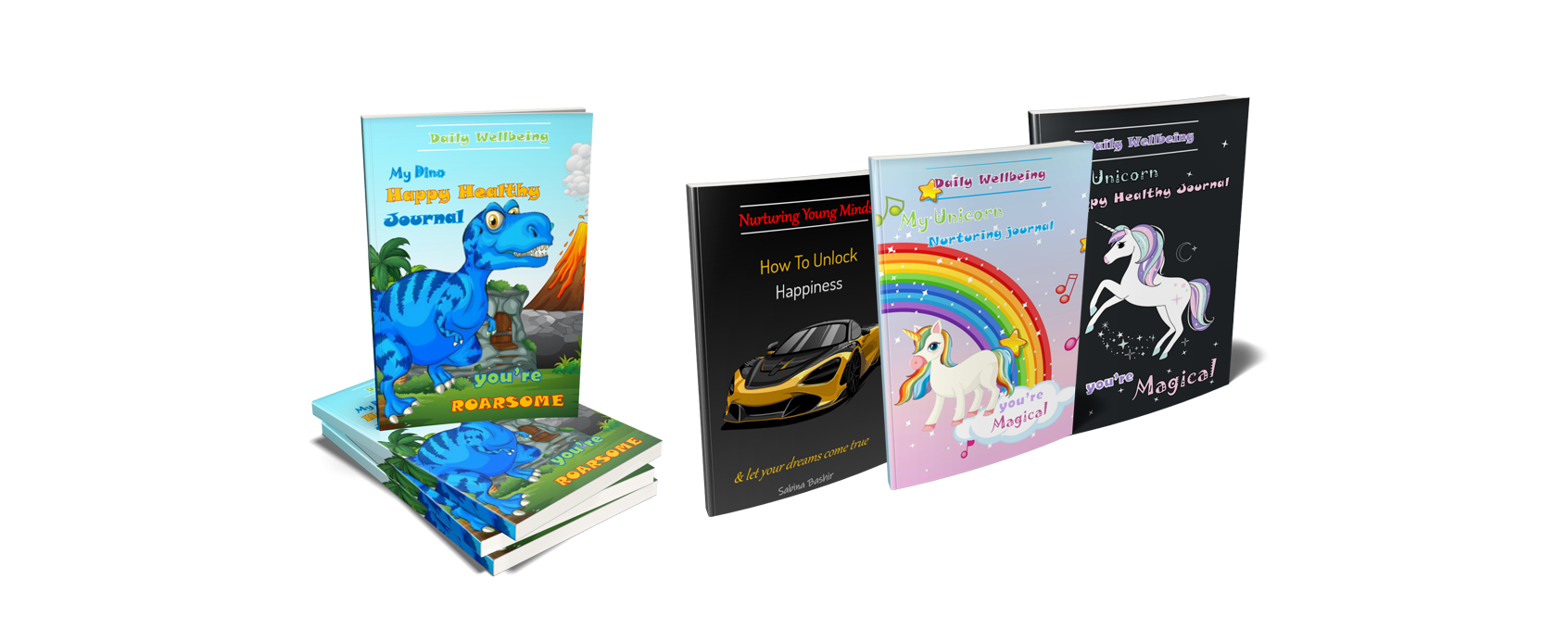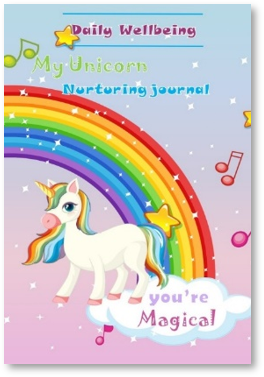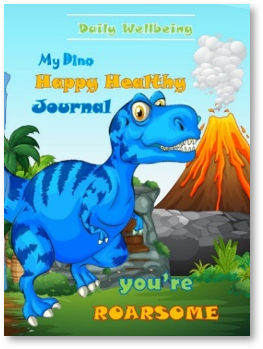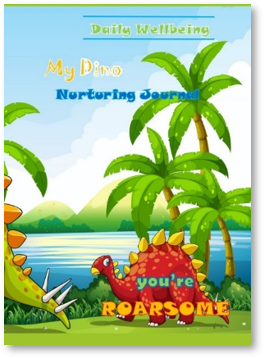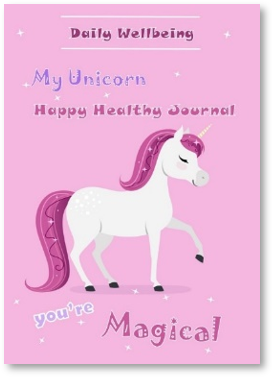LOOK INSIDE
Testimonials - What others have to say
All children should have one of these. They really help you think about what's happening inside you, and what to do. Got some really good advice. These really helped me when I was sad.
Aleysha R
Really helping my 3 year old develop a routine and express himself. It's (My Dino Nurturing Journal) very good.
Faye
The children who have /are using these have learnt so many strategies and have transferred these into their lives.
Mr Hussain
It's not any old journal, it's a proper mind tool. Really makes children think about what they are doing and should be doing. It really has an impact on their behaviour. It's great that they can use it every day to start their day off right.
Laylah P.

@pmhwb Do you want a happier child? 👩🦱🧑 Find out how to unlock their happiness. 😊 Don’t take our word for it.❤️ Listen to this 9 year old. Sometimes life can be hard, leaving us feeling upset, stressed or totally anxious. But you don’t have to stay stuck in a bad mood for long or let worries hold you back. Discover the secrets to unlocking happiness in this guide to Dreaming Big. This guide is packed full of tips, daily activities and fun ideas that can help you navigate life’s challenges with a smile. Suitable for tweens and preteens aged 8+ years old. Live the life you deserve and be HAPPY! Unlock the happiness you deserve and start living your dreams today! Please Follow for more inspiring content and also because it encourages TikTok to show the video to more people who it might help. Thanks 🥰 and visit: PromotingMentalHealthAndWellbeing.com/journals❤️🧠💪 Or click my bio for more info. #longervideos #happy #happiness #friday #quotes #wellbeing #ADHD #parents #parenting #teachers #mentalhealthinchildren #mentalhealthactivitiesforchildren #mentalhealthinchildren #Childrensmentalhealth #kidsmentalhealth #Mentalhealthfacts #Mentalhealthawareness #Mentalhealthjournal #Dailyjournalingformentalhealth #Journalstohelpwithmentalhealth ♬ original sound – Neuroplastician Mindset Coach
These are NOT your average journal. These specially crafted “Mind Enhancing Tools” help a child in several ways. Here’s a look at the benefits children can gain from using our mental health journals:
Develop routine: Every day, children fill in the My Happy Journals to develop routine and success habits. These provide stability, consistency and a sense of achievement, keeping them on the path to better health and wellbeing.
Increased Self-Awareness: Our mental health journals prompt children to reflect on their emotions and recognize patterns in their moods, fostering greater self-awareness and understanding of their feelings.
Emotional Regulation: Through regular journaling, children learn to manage their emotions more effectively by identifying triggers and developing healthy coping strategies.
Improved Communication: Mental Health journals serve as a channel for children to express their thoughts and feelings, facilitating open communication with parents, guardians, or mental health professionals.
Goal Setting: Children can set and track personal goals related to their emotional wellbeing and self-care routines, helping them stay motivated and focused on positive changes.
Stress Reduction: Writing in a mental health journal provides a therapeutic outlet for children to release their thoughts and emotions, reducing stress and promoting relaxation.
Resilience Building: Journaling about challenges and triumphs helps children build resilience, boosting their confidence and belief in their ability to overcome obstacles.
Identifying Positive Patterns: Mental Health Journals help children recognize activities or behaviours that contribute to their wellbeing, encouraging them to prioritise positive habits and self-care practices.
Monitoring Progress: Over time, children can observe how their mood and wellbeing evolve, fostering a sense of accomplishment and motivation to continue their self-care journey.
Creative Outlet: Our mental health journals offer children a creative platform to express themselves through writing, drawing, or other artistic mediums, promoting enjoyment and therapeutic release.
Mindfulness Practice: Engaging in journaling encourages mindfulness, encouraging children to be present and attentive to their thoughts and feelings, ultimately enhancing their emotional wellbeing.
By incorporating these benefits into their daily routine, children can develop valuable skills for managing their mental health and navigating life’s challenges with resilience and confidence.
Our Mental Health Journals offer children a private, accessible and flexible tool to support their emotional wellbeing. They can use the journals anytime, anywhere, at their own pace, ensuring a comfortable space to reflect without judgment. Cost-effective and easy to maintain, these journals encourage continuous self-awareness and the development of personalized coping strategies. With regular use, they can become a long-term practice for emotional growth, giving children the tools to navigate life’s challenges with confidence and resilience.
When a Mental Health Journal May Be More Appropriate than therapy:
There are instances when journaling may be more appropriate for children:
Self-Exploration and Self-Awareness: Mental Health Journals serve as valuable tools for children seeking to explore and better understand their emotions, thoughts and experiences. They offer a means for self-reflection and personal growth.
Mild Stress or Emotional Challenges: For children experiencing mild stress, occasional anxiety or common emotional challenges, journaling can offer a self-help method to manage their feelings and engage in self-care practices.
Privacy and Independence: Mental Health Journals are ideal for children who prefer a private and independent approach to addressing their emotional wellbeing. Some children may feel more comfortable expressing themselves through journaling rather than discussing their feelings with a therapist.
Cost Constraints: Families facing financial constraints may choose journaling as a cost-effective way to promote emotional wellbeing. Unlike professional therapy, journaling does not incur additional expenses.
Ongoing Self-Care: Mental Health Journals provide a consistent platform for maintaining emotional wellbeing over the long term. Children can use them as a regular practice to monitor their mood, set goals and track their progress.
Mental Health Journals as Support Alongside Other Therapies:
Severe or Complex Mental Health Issues: For children facing severe depression, anxiety disorders, trauma or other complex mental health challenges, therapy provided by a trained professional is often the most appropriate option. Therapists can offer targeted interventions and support tailored to these specific issues.
Clinical Diagnosis: Children with diagnosed mental health conditions may benefit from therapy that is specifically tailored to their needs. Therapists can develop comprehensive treatment plans and implement evidence-based interventions to address diagnosed conditions effectively.
Immediate Crisis or High-Risk Situations: In cases where a child is experiencing an immediate crisis, such as suicidal thoughts or high risk of self-harm, professional therapy is crucial. It allows for a structured and immediate response to address the crisis and ensure the child’s safety.
Specific Behavioural or Cognitive Challenges: Therapy is particularly effective in addressing specific behavioural or cognitive challenges in children. Therapists can work with children to modify unhelpful thought patterns and behaviours through targeted interventions.
Support and Guidance: Cognitive Behavioural Therapy (CBT) involves the guidance and support of a trained therapist who can offer evidence-based interventions and strategies. Therapists can customise treatment plans to meet the child’s unique needs and goals.
In many cases, the combination of both therapy with journaling can be beneficial. Children can use a journal as a supplement to their therapy, providing a means for self-reflection between sessions and tracking progress.
All wellbeing journals are available from our shop.
